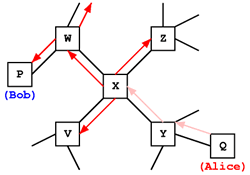John Perry Barlow now has a blog. He's one of my favorite people to listen to, and he certainly has a way with words. Here he's talking about what happens when audio and video conferencing now become so easy and cheap that you can just leave them on. And, incidentally, with Joi Ito in Japan who's another of my favorite people."I just had another transforming telecommunications experience. Again, Joi Ito was involved.
Joi and I were typing at each other over the Net using Apple's iChat AV. I've never liked Internet chat. I don't like having to type that fast. So, at a certain point, I asked him whether he'd used the audio capacities that are built into iChat AV. I hadn't. A moment later we were conversing by voice through our computers. Despite the fact that Joi is presently in his country house outside of Tokyo and I'm at my condo in Salt Lake, it sounded like he was in the room with me. There was no discernible latency or loss of fidelity.
For awhile, we talked as though we were on the phone, and I marveled at being able to conduct a zero-cost trans-Pacific call. (Of course, there's nothing particularly new about voice over IP. But it's never been so stupidly easy to set up, in my personal experience, as it is with iChat AV. Also, it never sounded this good before.)
The really interesting shift occurred as we drifted back to what we'd been doing before we started chatting, leaving the audio channel open as we'd did so. We could hear each other typing. One of my daughters entered the room and spoke to me. Joi heard her and said hello. They had a brief conversation, their first since she was a little girl. Joi and I returned our e-mail. I wanted to set up an account on Technorati and broke in to ask him how to do it. He walked me through the process. There were other occasional interjections. I could hear the sounds of construction going on in his house.
For a long time, it was as though we were working in the same room, each of us alone with his endeavors and yet... together. Though half a world away.
This feels significant to me. Even over shorter distances, people rarely think of phone calls as being so casually cheap that one would simply leave the connection open for ambient telepresence and occasional conversation. To create shared spaces that span the planet, and to do so whenever you feel like it, and to leave them unpurposefully in place for hours, is not something people have done very often before.
The next step is to make those shared spaces larger, so that multiple people can inhabit the same auditory zone, entering and leaving it as though it were a coffee house. This will change the way people live.
Big deal, you think. You can do this with conference calls now. But you don't. Conference calls are expensive and unstable. The sound quality usually sucks if you're using a speaker phone. I think this is different. It certainly felt different to me. I had the same shiver of the New that I got years ago the first time I ever used telnet and realized that I could get a hard disks to spin in any number of computers thousands of miles away just by entering a few keystrokes.
Eventually, Joi had to leave to attend to other business his distant part of Meatspace. We collapsed our huge virtual room into nothing.
I went out on my balcony. In the snowy garden below, I watched a deer chase a huge raccoon into the bushes." There's a good point there. See, I've kind of avoided audio and video conferencing, for the same reason I don't like phone calls very much. They tend to take all your attention, so I can't do other things at the same time. And there's no record of them, so I can't go back and see what somebody said. But it is different if you can just hang out together. When it is just an addition to the ambience, when it is just another open channel, bringing somebody in a different part of the world in here with you and whatever else you're doing, rather than it being a formal all-consuming intensive transaction that you need to drop everything else for.
[ Culture | 2003-12-23 09:48 | | PermaLink ] More >
|
 Here's another overview of how ants find food, with the thought towards applying that to program algorithms. It is from MUTE, a new file sharing program. They use a similar, but somewhat improved, approach to decide how best to find a certain user in the network. I fail to see exactly why it would be useful or efficient to do it that way, but there's something there, of course. Generally speaking the thought is that we have a network, similar to a neural network, and it learns how best to find stuff based on the success of past attempts to find it. Which is how it should be, of course. But ants only need to signal where there's food and where the home nest is. It is, despite the simple 'random' approach to mapping it, a rather centralized scheme of organization. The ants are not centrally controlled, but it all revolves around bringing food back to the nest and similar activities. We have potentially billions of pieces of information and billions of places to find it. I'm not sure how we can manage that really well without each node keeping a whole record of everything it has been asked for and where it sent it and where it came back from. Kind of like a google database in each node. But maybe I just don't get it yet.
Here's another overview of how ants find food, with the thought towards applying that to program algorithms. It is from MUTE, a new file sharing program. They use a similar, but somewhat improved, approach to decide how best to find a certain user in the network. I fail to see exactly why it would be useful or efficient to do it that way, but there's something there, of course. Generally speaking the thought is that we have a network, similar to a neural network, and it learns how best to find stuff based on the success of past attempts to find it. Which is how it should be, of course. But ants only need to signal where there's food and where the home nest is. It is, despite the simple 'random' approach to mapping it, a rather centralized scheme of organization. The ants are not centrally controlled, but it all revolves around bringing food back to the nest and similar activities. We have potentially billions of pieces of information and billions of places to find it. I'm not sure how we can manage that really well without each node keeping a whole record of everything it has been asked for and where it sent it and where it came back from. Kind of like a google database in each node. But maybe I just don't get it yet. Apparently Saddan Hussein wasn't just captured due to the excellence of U.S. intelligence. See here or here. The Kurds seem to say that he was captured by US troops only after he had been taken prisoner by Kurdish forces, drugged and abandoned ready for American soldiers to recover him, after a suitable deal had been agreed upon. That'll explain the way he looked, of course.
Apparently Saddan Hussein wasn't just captured due to the excellence of U.S. intelligence. See here or here. The Kurds seem to say that he was captured by US troops only after he had been taken prisoner by Kurdish forces, drugged and abandoned ready for American soldiers to recover him, after a suitable deal had been agreed upon. That'll explain the way he looked, of course.